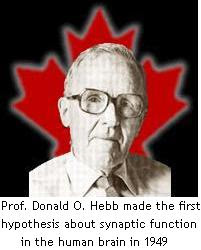When it comes to human memory, it seems that Canadians are endowed with a special gift of owning the right to unravel its mystery.
The currently pursued hypothesis is based on the proposals made by Donald Hebb, a psychology professor from Canada.
Recently Dr. Kunjumon Vadakkan, also a Canadian, has come up with a new hypothesis named as “Semblance Hypothesis”.
as “Semblance Hypothesis”.
Back in 1949, Professor Hebb proposed that when two neurons fire together then the junction between them, named synapse, undergoes changes.
Since then scientists all around the globe were struggling more than half a century to put together these pieces of synaptic change puzzle to find answers for memory.
Even though experiments conducted thereafter proved changes in synapses, sufficient mechanism for memory was not found.
Alternative proposals for the mechanism of memory also couldn’t find answers.
Scientific nature of memory requires theoretical suggestions similar to that in Physics, followed by laboratory investigations to test it.
Dr. Vadakkan now says that our memory is from “systematic functional illusions” occurring at the shared post synapses and exneurons.
The physician turned biochemist from Kerala state in India came to Canada after spending some years of research in India.
He has received a PhD in Physiology and Neuroscience from the University of Toronto.
Dr. Kunjumon Vadakkan's brand new “Semblance Hypothesis” about the human memory is now published as a book
Read the full explanation about the hypothesis here
Friday, December 28, 2007
Revolutionary new Hypothesis about Human Memory
Posted by
Guy Derla
at
11:50 AM
![]()
Tags: Canada, Canadian health care, hypothesis, memory, Ontario, physician, Physics, Scientist, Toronto, University of Toronto
Subscribe to:
Post Comments (Atom)


1 comment:
It looks really revolutionary!
Will it answer the doubts cast by Jeff Hawkins in his talk about the intuitive, strongly held but incorrect assumption that prevented us from understanding the brain?
http://www.ted.com/index.php/talks/jeff_hawkins_on_how_brain_science_will_change_computing.html
Let us wait and see !
Post a Comment